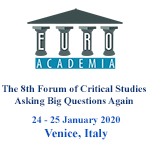Euroacademia Conferences
 Europe Inside-Out: Europe and Europeanness Exposed to Plural Observers (9th Edition) April 24 - 25, 2020
Europe Inside-Out: Europe and Europeanness Exposed to Plural Observers (9th Edition) April 24 - 25, 2020 Identities and Identifications: Politicized Uses of Collective Identities (9th Edition) June 12 - 13, 2020
Identities and Identifications: Politicized Uses of Collective Identities (9th Edition) June 12 - 13, 2020 8th Forum of Critical Studies: Asking Big Questions Again January 24 - 25, 2020
8th Forum of Critical Studies: Asking Big Questions Again January 24 - 25, 2020 Re-Inventing Eastern Europe (7th Edition) December 13 - 14, 2019
Re-Inventing Eastern Europe (7th Edition) December 13 - 14, 2019 The European Union and the Politicization of Europe (8th Edition) October 25 - 26, 2019
The European Union and the Politicization of Europe (8th Edition) October 25 - 26, 2019 Identities and Identifications: Politicized Uses of Collective Identities (8th Edition) June 28 - 29, 2019
Identities and Identifications: Politicized Uses of Collective Identities (8th Edition) June 28 - 29, 2019 The European Union and the Politicization of Europe (7th Edition) January 25 - 26, 2019
The European Union and the Politicization of Europe (7th Edition) January 25 - 26, 2019 7th Forum of Critical Studies: Asking Big Questions Again November 23 - 24, 2018
7th Forum of Critical Studies: Asking Big Questions Again November 23 - 24, 2018 Europe Inside-Out: Europe and Europeanness Exposed to Plural Observers (8th Edition) September 28 - 30, 2018
Europe Inside-Out: Europe and Europeanness Exposed to Plural Observers (8th Edition) September 28 - 30, 2018 Identities and Identifications: Politicized Uses of Collective Identities (7th Edition) June 14 - 15, 2018
Identities and Identifications: Politicized Uses of Collective Identities (7th Edition) June 14 - 15, 2018
Museu do Amanhã: The Emergent Cultural Industry in Brazil
-
-

-
Presentation speakers
- Davi Lemos, Erasmus University Rotterdam, The Netherlands
- Alice DeMattos, Erasmus University Rotterdam, The Netherlands
- Download presentation
Abstract:
The cultural revitalisation of urban centres and port areas can be interpreted as being strategies based on historical rescue, economic development, and resignification of urban identities. These strategies do not lack meaningfulness, being impossible to be dislocated from social and political relations, which can interfere in the process in various ways. Such a scenario challenges the contemporary understanding of concepts such as ‘urban heritage’, ‘historical centre’, ‘collections’, ‘monument’, ‘identity’, etc. In this context, the category of ‘culture’ is appropriated as a political tool with which the ideal of consensus and union is revendicated. Therefore, projects of urban revitalisation are a space of dispute, where culture can be (de)legitimised. (Pio 2013). Museums are part of these interventions as they are inserted into the cultural-creative segment. Their primary role is to awaken creative and critical thinking among children, young people and adults, by experimenting with new ways of learning, encouraging them to dream and live the said culture, through the exercise of their citizenship (Demattos & Diniz 2019). Today they are also spaces of art, places of knowledge production, where local meaning is not absent, at the same time, however, they constitute centres of consumption, adapting to the emerging trend in the contemporary urbanised world: centres of visitation that offer innovative scientific-artistic services to enhance the visitor’s experience. In this way, the main aim of this study is to explore the emergent state of the cultural-creative industry in Brazil, using Rio de Janeiro’s Museu do Amanhã as a case study. The Museu do Amanhã, as a pillar of social interaction, knowledge, and sustainability, stylised as an urbanistic and cultural project, needs to fully engage with the understanding of how to completely integrate itself into the city and its socioeconomic reality. As an instrument of socioeconomic development and transformation, the institution’s management should invest in legitimising their cultural experience as a collective experience. In so doing, invisible barriers will be overcome and society as a whole will be able to enjoy and live the urban intervention feeling of belonging and sharing an identity. Even though the museum has many projects and initiatives seeking this ideal – such as Coral uma só voz, the social aspects of both the Observatory and the LAA, as well the Community Relation -, there is still a long way to go, not only by them, but by cultural institutions worldwide. The paper, after introducing the thematic, continues with a literature review, in which both emerging sector and cultural economy fields are presented, focusing on the museum as a business as well as a socioeconomic asset. It also examines the two sides of Museu do Amanhã, in a historical analysis of its creation and its present-day representations. Some critiques are addressed relying on a sociological perspective connected to the museum’s meaning. It concludes that the museum deals with conflictive aspects as an urban intervention, facing the challenge of how its institution, as a business in the urban-heritage-cultural-creative industry, is going to carry its identity, and the consequent construction of the socio-cultural identity of the city. If on the one hand, the museum acts according to the bourdierian concept of a social distinction mechanism; on the other side, it has a sociocultural responsibility of legitimising its cultural experience as a collective experience.
-
Related Presentations













